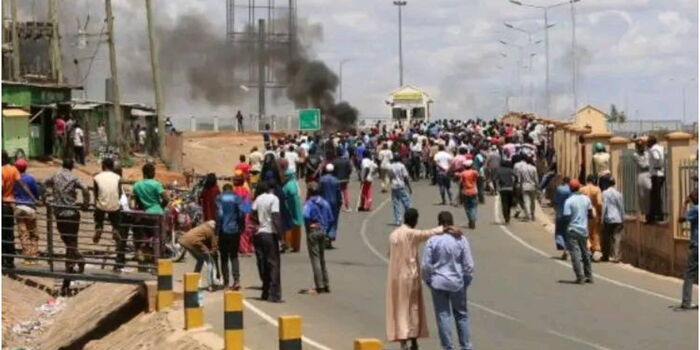A growing wave of concern has spread across East Africa after reports confirmed that several Kenyans were among the hundreds of people killed in Tanzania following the country’s disputed general election.
The situation has sparked outrage and fear as violence continues to escalate across major Tanzanian cities.
VOCAL Africa CEO and human rights activist Hussein Khalid sounded the alarm on Sunday, revealing that some Kenyans had fallen victim to the deadly chaos.
Through a statement shared on X (formerly Twitter), Khalid said he had received credible reports indicating that Kenyan citizens had lost their lives during the violent clashes that erupted after the October 29 elections.
Among the victims identified was John Okoth Ogutu, a Kenyan teacher who had been living and working in Tanzania.
According to Khalid, Ogutu was allegedly shot dead on election day in Ubungo, Dar es Salaam, and his body was later taken to the Mwananyamala Mortuary.
Khalid expressed deep sadness over the tragedy and urged both the Kenyan and Tanzanian governments to investigate the circumstances surrounding the killings.
The violence began shortly after Tanzanians went to the polls on October 29. The election was marked by controversy, accusations of bias, and widespread anger over the suppression of opposition voices.
The main opposition leader, Tundu Lissu of the CHADEMA Party, is currently facing treason charges, while another major opposition figure, Luhaga Mpina of the ACT-Wazalendo Party, was disqualified from contesting.
This left many citizens feeling unrepresented and frustrated, leading to widespread boycotts and protests.
Large numbers of Tanzanians stayed away from polling stations, arguing that the election was neither free nor fair.
Despite visible voter apathy, the Tanzanian Electoral Commission announced that President Samia Suluhu Hassan had won the election with an overwhelming 98 per cent of the total votes — amounting to 31.9 million out of 32 million votes.
The commission also claimed that the voter turnout stood at nearly 87 per cent, a figure that opposition parties and several independent election observers have dismissed as highly exaggerated and false.
As the announcement was made, anger erupted across the country. Protesters poured into the streets of major towns, chanting for democracy and fair governance.
Police responded with heavy force, using live bullets, tear gas, and batons to disperse the crowds.
Reports indicate that hundreds of people have been killed, while many others have sustained serious injuries or gone missing.
On October 30, a day after the elections, violence spread to the Namanga border between Kenya and Tanzania.
Security officers intervened to stop a group of Kenyan activists who attempted to cross the border to join the protests in solidarity with Tanzanian citizens. Kenyan authorities quickly moved in to prevent the unrest from spilling into their territory.
While the Tanzanian government has remained largely silent about the true death toll, the opposition party CHADEMA has claimed that around 700 people have died since the protests began.
Independent journalists and human rights organizations, however, have struggled to verify these numbers due to limited access and government-imposed restrictions on media coverage.
On October 31, a diplomatic source told the BBC that there was credible evidence suggesting that at least 500 people had been killed in the ongoing skirmishes.
The source described the situation as a “national crisis” that could spiral into a regional concern if not addressed urgently.
Human rights advocates across East Africa are now calling for international intervention and an independent investigation into the post-election violence.
They argue that the suppression of dissent and use of deadly force by security forces violate both Tanzanian law and international human rights standards.
Meanwhile, Kenyans continue to mourn their compatriots who were caught in the chaos. Families of victims like John Okoth Ogutu are demanding answers and justice, pleading with the Kenyan government to ensure that their loved ones’ deaths are not forgotten.
The situation in Tanzania remains tense, with daily demonstrations in parts of Dar es Salaam, Dodoma, and Arusha.
Observers fear that unless urgent measures are taken to restore calm and uphold democratic principles, the violence could deepen, putting more lives at risk and straining relations with neighboring countries, including Kenya.
Join Government Official WhatsApp Channel To Stay Updated On time
https://whatsapp.com/channel/0029VaWT5gSGufImU8R0DO30


